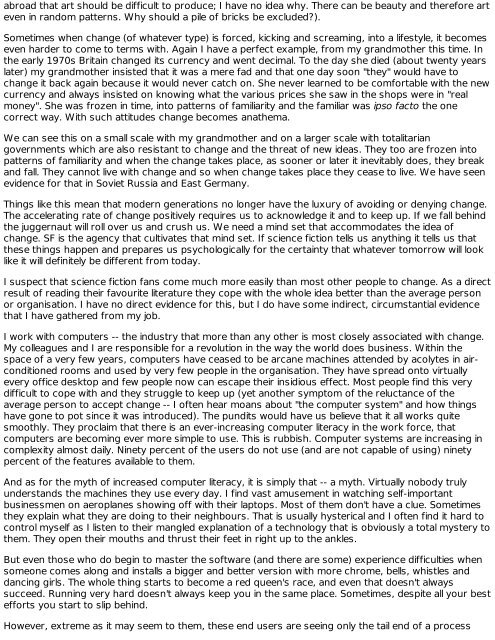Triffids Beard 2 - The Bearded Triffid
Triffids Beard 2 - The Bearded Triffid
Triffids Beard 2 - The Bearded Triffid
You also want an ePaper? Increase the reach of your titles
YUMPU automatically turns print PDFs into web optimized ePapers that Google loves.
abroad that art should be difficult to produce; I have no idea why. <strong>The</strong>re can be beauty and therefore art<br />
even in random patterns. Why should a pile of bricks be excluded?).<br />
Sometimes when change (of whatever type) is forced, kicking and screaming, into a lifestyle, it becomes<br />
even harder to come to terms with. Again I have a perfect example, from my grandmother this time. In<br />
the early 1970s Britain changed its currency and went decimal. To the day she died (about twenty years<br />
later) my grandmother insisted that it was a mere fad and that one day soon "they" would have to<br />
change it back again because it would never catch on. She never learned to be comfortable with the new<br />
currency and always insisted on knowing what the various prices she saw in the shops were in "real<br />
money". She was frozen in time, into patterns of familiarity and the familiar was ipso facto the one<br />
correct way. With such attitudes change becomes anathema.<br />
We can see this on a small scale with my grandmother and on a larger scale with totalitarian<br />
governments which are also resistant to change and the threat of new ideas. <strong>The</strong>y too are frozen into<br />
patterns of familiarity and when the change takes place, as sooner or later it inevitably does, they break<br />
and fall. <strong>The</strong>y cannot live with change and so when change takes place they cease to live. We have seen<br />
evidence for that in Soviet Russia and East Germany.<br />
Things like this mean that modern generations no longer have the luxury of avoiding or denying change.<br />
<strong>The</strong> accelerating rate of change positively requires us to acknowledge it and to keep up. If we fall behind<br />
the juggernaut will roll over us and crush us. We need a mind set that accommodates the idea of<br />
change. SF is the agency that cultivates that mind set. If science fiction tells us anything it tells us that<br />
these things happen and prepares us psychologically for the certainty that whatever tomorrow will look<br />
like it will definitely be different from today.<br />
I suspect that science fiction fans come much more easily than most other people to change. As a direct<br />
result of reading their favourite literature they cope with the whole idea better than the average person<br />
or organisation. I have no direct evidence for this, but I do have some indirect, circumstantial evidence<br />
that I have gathered from my job.<br />
I work with computers -- the industry that more than any other is most closely associated with change.<br />
My colleagues and I are responsible for a revolution in the way the world does business. Within the<br />
space of a very few years, computers have ceased to be arcane machines attended by acolytes in airconditioned<br />
rooms and used by very few people in the organisation. <strong>The</strong>y have spread onto virtually<br />
every office desktop and few people now can escape their insidious effect. Most people find this very<br />
difficult to cope with and they struggle to keep up (yet another symptom of the reluctance of the<br />
average person to accept change -- I often hear moans about "the computer system" and how things<br />
have gone to pot since it was introduced). <strong>The</strong> pundits would have us believe that it all works quite<br />
smoothly. <strong>The</strong>y proclaim that there is an ever-increasing computer literacy in the work force, that<br />
computers are becoming ever more simple to use. This is rubbish. Computer systems are increasing in<br />
complexity almost daily. Ninety percent of the users do not use (and are not capable of using) ninety<br />
percent of the features available to them.<br />
And as for the myth of increased computer literacy, it is simply that -- a myth. Virtually nobody truly<br />
understands the machines they use every day. I find vast amusement in watching self-important<br />
businessmen on aeroplanes showing off with their laptops. Most of them don't have a clue. Sometimes<br />
they explain what they are doing to their neighbours. That is usually hysterical and I often find it hard to<br />
control myself as I listen to their mangled explanation of a technology that is obviously a total mystery to<br />
them. <strong>The</strong>y open their mouths and thrust their feet in right up to the ankles.<br />
But even those who do begin to master the software (and there are some) experience difficulties when<br />
someone comes along and installs a bigger and better version with more chrome, bells, whistles and<br />
dancing girls. <strong>The</strong> whole thing starts to become a red queen's race, and even that doesn't always<br />
succeed. Running very hard doesn't always keep you in the same place. Sometimes, despite all your best<br />
efforts you start to slip behind.<br />
However, extreme as it may seem to them, these end users are seeing only the tail end of a process


